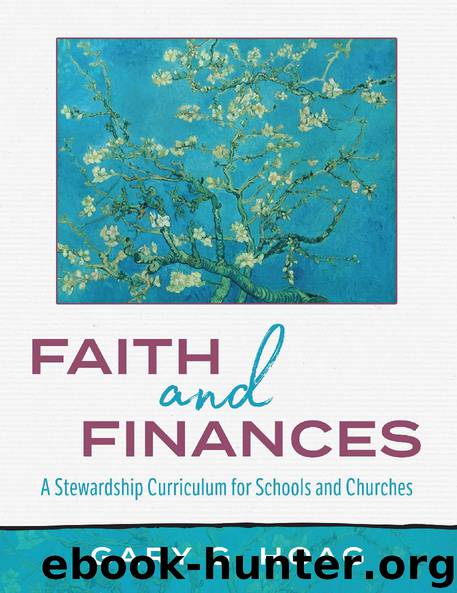Faith and Finances by Gary G. Hoag

Author:Gary G. Hoag
Language: eng
Format: epub
Publisher: Seedbed Publishing
Published: 2017-07-15T00:00:00+00:00
4. The Guiding Accounting Principles
“It’s not only the grabber of other people’s property who is avaricious, but the one who greedily looks after his own . . . Someone who stashes away vast quantities—how much does he take from it all to live on? When he’s taken that and somehow or other has set aside in his mind what’s enough to live on, let him consider who will have the rest that’s left over; or perhaps, while you are saving what to live on, you may be storing up what to die from.” Augustine, Sermon 107.4. Translated by Daniel Doyle and Edmund Hill.
“I do not say, ‘Be a good Jew, giving a tenth of all you possess.’ I do not say, ‘Be a good Pharisee, giving a fifth of all your substance.’ I dare not advise you to give half of what you have; no, nor three quarters; but all!” John Wesley, “The Danger of Riches” Sermon 2.8.
“The Old Testament records ‘tithing’ as a means to honor God with your finances. The Israelites were commanded to bring the best 10 percent of their finances (typically their harvest) to God (Leviticus 27:30).
“The practice of tithing trained the Israelites to remember who was first in their lives. Realizing that God provided the entire 100 percent, the first 10 percent was given to Him. In fact, life in the Old Testament was replete with various offerings and charitable giving.
“There was no denying that all they had came from God. As a result, giving was ingrained into their relationship with God. When they did not give appropriately, their faith suffered. It wasn’t a forced situation. Instead, their faith and their giving ( i.e., their finances) were intertwined. The tithe, then, was just a beginning point for their giving, not some budget item that they checked off in order to be right with God.
“What does that mean for us today? The compulsory nature of the Old Testament commandment to tithe has been replaced by a greater command to practice generosity at all times (2 Corinthians 9:6–8). For Jesus and his followers who grew up with the practice of tithing, giving to God meant so much more than just a 10 percent offering. Yet there is no exact amount or percentage that is commanded in the New Testament.
“But like any other activity in life, becoming more generous requires a level of discipline. We don’t become generous overnight. We need to develop practices in our lives to train us to be more openhanded and charitable with our finances.” Andy Stanley, Balanced: Gaining and Maintaining Financial Stability (25).
“Jesus told a story about a rich man who made a fool of himself by the way he handled his money . . . Luke 12:16–21 . . .
“The first mistake a fool makes with his money is relying on man’s reason and not God’s revelation. Verse 17 tells us the man ‘began reasoning to himself.’ He looked around at his bumper crop and began considering what he should do with his excess.
Download
This site does not store any files on its server. We only index and link to content provided by other sites. Please contact the content providers to delete copyright contents if any and email us, we'll remove relevant links or contents immediately.
The 5 Love Languages: The Secret to Love That Lasts by Gary Chapman(8497)
The Space Between by Michelle L. Teichman(6088)
Assassin’s Fate by Robin Hobb(5237)
Wiseguy by Nicholas Pileggi(4586)
Everything Happens for a Reason by Kate Bowler(4067)
Gerald's Game by Stephen King(3918)
A Simplified Life by Emily Ley(3573)
The Power of Positive Thinking by Norman Vincent Peale(3450)
Pillow Thoughts by Courtney Peppernell(3397)
Resisting Happiness by Matthew Kelly(2887)
Girl, Wash Your Face by Rachel Hollis(2822)
Being Aware of Being Aware by Rupert Spira(2706)
Name Book, The: Over 10,000 Names--Their Meanings, Origins, and Spiritual Significance by Astoria Dorothy(2490)
Real Sex by Lauren F. Winner(2476)
More Language of Letting Go: 366 New Daily Meditations by Melody Beattie(2444)
The Holy Spirit by Billy Graham(2418)
Fast Facts on Defending Your Faith by John Ankerberg & John Weldon(2389)
Victory over the Darkness by Neil T. Anderson(2386)
The Secret Power of Speaking God's Word by Joyce Meyer(2253)
